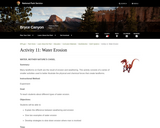
In this activity, students learn about different types of water erosion and develop strategies to slow down erosion where man is involved.
- Subject:
- Science
- Material Type:
- Activity/Lab
- Provider:
- National Park Service
- Date Added:
- 07/24/2018

In this activity, students learn about different types of water erosion and develop strategies to slow down erosion where man is involved.
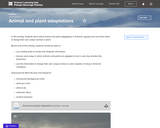
Students learn about animal and plant adaptations in Antarctic species and use these ideas to design their own unique animal or plant.

Students analyze a map of the North Polar region, test their knowledge of the Arctic, and brainstorm examples of the interconnectedness of life in this region with life around the world.
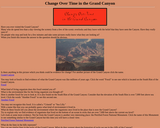
Using this website, students can observe photographs of the Grand Canyon today and compare them with photographs of fossils of sea life found in the Grand Canyon. Students are asked to draw conclusions based on their observations of the photographs and a short article with an explanation is provided.
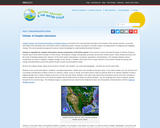
This article continues an examination of each of the seven essential principles of climate literacy on which the online magazine Beyond Weather and the Water Cycle is structured. Principle 2 covers the complex interactions among the components of the Earth system. The author discusses the scientific concepts underlying the interactions and expands the discussion with diagrams, photos, and online resources.
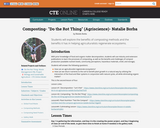
With prior knowledge of food and organic matter decomposition, students will use industry and extension publications to learn the processes of composting, as well as the benefits and challenges of compost production (available nutrient levels, community perceptions, hazardous materials, smell, and storage).

David Gallo take us on a voyage into the ocean, specifically how and why we explore deep ocean environments. Discussion/assessment questions and suggested supplemental resources are included.

This article provides links to web sites that describe the Arctic and Antarctica in terms of geography, climate, and ecosystems.
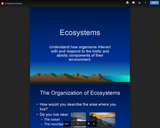
This is a Google slideshow that contains all of the information for the 8th grade Ecosystems unit.
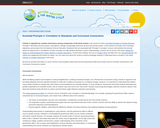
This article aligns the concepts of Essential Principle 2 of the Climate Sciences to the K-5 content standards of the National Science Education Standards. The author also identifies common misconceptions about heat and the greenhouse gases effect and offers resources for assessing students' understanding of interactions among components of the Earth system. This article continues the examination of the climate sciences and climate literacy on which the online magazine Beyond Weather and the Water Cycle is structured.
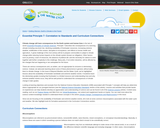
This article identifies age-appropriate national science education content standards and curriculum connections for introducing complex concepts contained in Principle 7 of the Essential Principles of Climate Sciences. The principle describes consequences of climate changes on Earth systems and human lives. The content standards will help teachers determine appropriate topics for their students. A number of resources from the online magazine Beyond Weather and the Water Cycle are highlighted for their connection to the science curriculum in the early grades. In addition, the article identifies common misconceptions about weather and the water cycle often held by students.

Students participate in a simulation of a Shark Bay food web to view the relationships between members of that ecosystem.
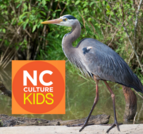
In this short video, join Brandon and Emily on a nature hike with Falyn from the NC Wildlife Resources Commission as they discover all kinds of plants and animals and learn a thing or two about the amazing nature of North Carolina!
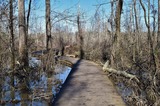
Virtual field trip to Haw River State Park.
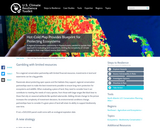
A regional conservation partnership in Massachusetts needed to update their approach to evaluating land acquisitions. Adding the complexity of climate change to their map helped resolve their vision.

Attached is a 5 E lesson plan to use over 8-10 class periods. Students will research the interactions of plants and animals in different ecosystems.
Graphic organizer to guide students research is also attached.
After students complete research they will form ecosystem based groups to learn more about current threats and conservation efforts needed to preserve the ecosystem. They will create a "Spread the Word" media project to share publicly school wide.
You can also do some sort of conservation service learning activity to help students take their knowledge into the community. For instance, we do Adopt-a-Stream through our city. We clean and test the water in the stream across form our school twice a year.

Students are introduced to ecosystems, food webs, and keystone species. They draw a simple food web and predict the impact keystone species have on an ecosystem.

Students use photos and information about Australia's Shark Bay to draw and label a simple food web. Then they identify which animal in the ecosystem is a keystone species.

This article highlights lessons that help K-grade 5 students understand that animals and plants can only survive in certain environments.The lessons support the theme of an issue of the free online magazine Beyond Weather and the Water Cycle. The theme is "We Depend on Earth's Climate."
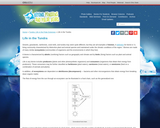
This article discuss basic ecological concepts such as food chains and webs within the context of the tundra.